Bibby Stockholm: Migrants return to barge amid protest at port gates
- Published
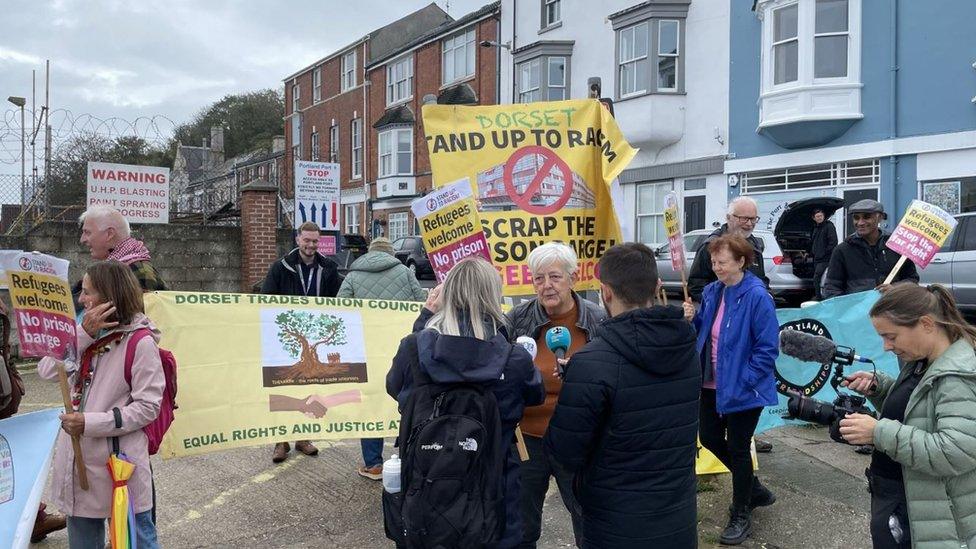
Protesters from the group Stand Up To Racism Dorset gathered outside the gates for Portland Port on Thursday
Migrants are returning to an accommodation barge amid protests at the port gates.
A coach carrying the migrants arrived at the Bibby Stockholm in Portland, Dorset, shortly before 13:00 BST.
The vessel, which has capacity for up to 500 men awaiting the outcome of asylum applications, was evacuated in August after Legionella bacteria was found in the water supply.
The Home Office said it was now "safe and secure".
The government has said "using vessels as alternative accommodation, like our European neighbours are already doing, will be better value for British taxpayers and more manageable for communities than costly hotels".
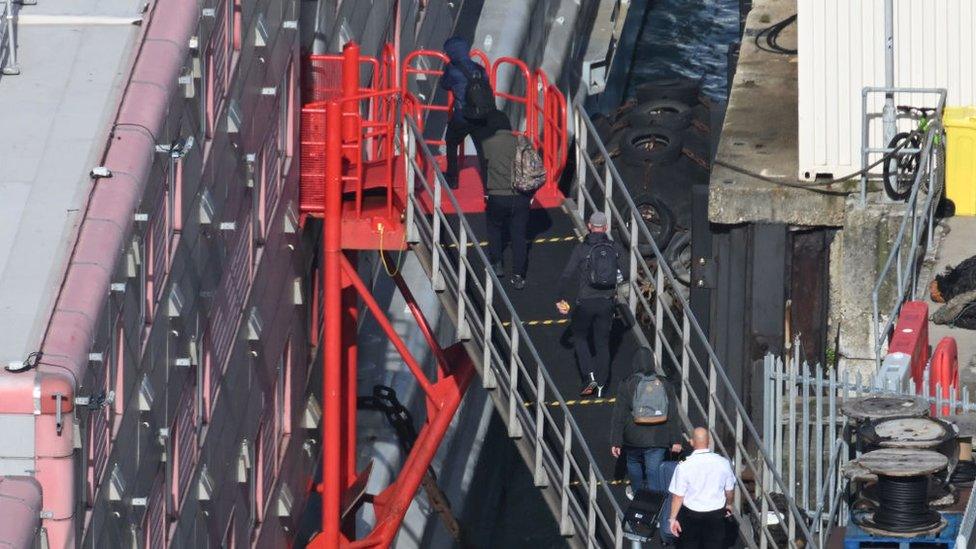
Migrants returned to the Bibby Stockholm on Thursday after being evacuated in August
About 30 protesters gathered at the port gates holding banners saying: "Scrap the prison barge! Refugees welcome."
Just Stop Oil activists managed to stop the coach carrying the asylum seekers in what they called a "positive protest" in support of the campaign against the use of the barge.
Dorset Police said two people were arrested on suspicion of criminal damage to the coach when it was stopped in Portland Beach Road, while a third person was held on suspicion of criminal damage to a police vehicle.
Candy Udwin, of Stand Up To Racism Dorset, said she had been in contact with some of those who had been staying on the Bibby Stockholm.
She said: "They hate it, they say it feels like a prison, some hate being on the sea, they find it very difficult to leave and they are completely separated from the community."
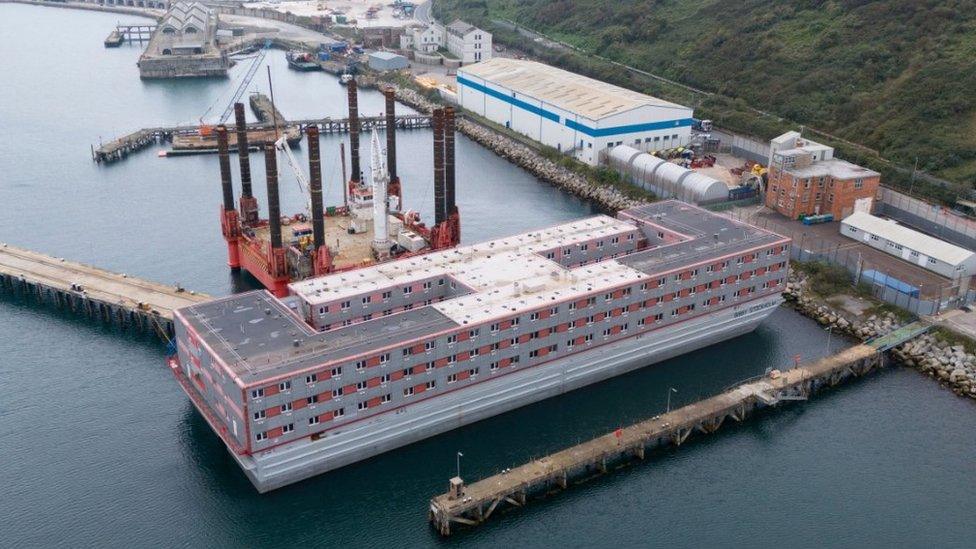
The barge has been moored at Portland Port since July
Less than a week after the men first went on the facility, all 39 were disembarked as a precaution when traces of Legionella bacteria, which can cause Legionnaires disease - a type of pneumonia, were found.
They were then moved to a hotel.
A letter, seen by the BBC, was sent to asylum seekers confirming their re-embarkation and reiterated all asylum accommodation continued to be offered on a "no-choice basis".
An asylum seeker, who asked to remain anonymous, spoke to the BBC ahead of his return to the vessel.
He said it had been a "difficult" process as he has not seen his family for nine months, but being in a hotel he had felt "free".
"It feels scary," he said, adding: "[The barge] will be crowded. If there's a single virus, then you know everyone will be affected. I think it will be very bad for all of us."
He added: "I lived there for five days and have experience on the barge, and that's why I am not happy to go back.
"In the hotel we are free to come and go at any time, we are free and [on the barge] we are bound to something - it's like a prison. It is difficult for all of us and many have said they don't want to go back."

A letter sent to asylum seekers reiterated all accommodation continued to be offered on a "no-choice basis"
The move comes after local councillor Carralyn Parkes lost a High Court fight with Home Secretary Suella Braverman over the lawfulness of housing asylum seekers on the ship.
Mr Justice Holgate ruled in the government's favour, saying Mrs Parkes did not have an arguable case.
She has since issued a further judicial review claim in the High Court challenging the ongoing decision by Dorset Council that it has no planning jurisdiction over the Bibby Stockholm in Portland Harbour.
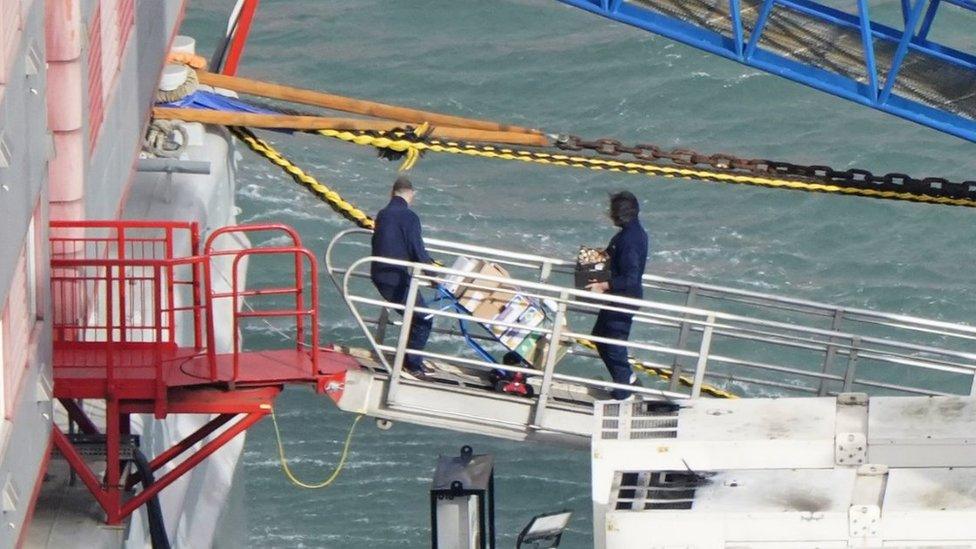
Supplies were seen taken on board the Bibby Stockholm on Tuesday

Floating illustration of complicated system
By Dan Johnson
West & south-west of England correspondent
The Bibby Stockholm was intended to show there's no luxury in the UK's asylum process, that Britain isn't the soft touch some think. But instead the accommodation barge - repeatedly delayed and beset by problems - became a floating illustration of how complicated our migration challenge is.
It was announced in April, was late arriving from Italy, then delayed for refit and inspections in Cornwall, and finally reached Portland in July. When journalists were shown on board we saw a clean and functional vessel with bedrooms down narrow corridors, typical of the industrial accommodation it previously offered to offshore oil workers.
Bunk beds were the obvious sign of the doubled capacity which concerned many opponents of the plan, and fire safety experts. What we couldn't see was the Legionella bacteria lurking in the water system.
That meant the government's August "small boats week" started with the first 39 asylum seekers stepping aboard, then ended with them evacuated back to hotels, after just five nights - embarrassing given the Home Office's intention to reduce hotel bills.
Watch: Inside the housing barge after first asylum seekers board
There will be a hope everything has now been double, if not triple, checked to avoid any further delays. But even if the Bibby Stockholm reaches its capacity of 500 men, that's only a tiny fraction of the 175,000 currently backlogged in the asylum system.
The barge is expected to draw further protests, having already proved controversial on Portland and beyond. Some people question - with the extra costs of chartering, mooring, transport and security - how a vessel can be cheaper than a hotel.
The risk is that conditions on board still look too harsh for those concerned about asylum seekers' rights, but not tough enough for those who want a harder line against immigration and small boat crossings. The solutions to "stop the small boats" are difficult and contentious.
The Bibby Stockholm was planned to be the first of a fleet of barges moored around the coast. So far, it stands alone.

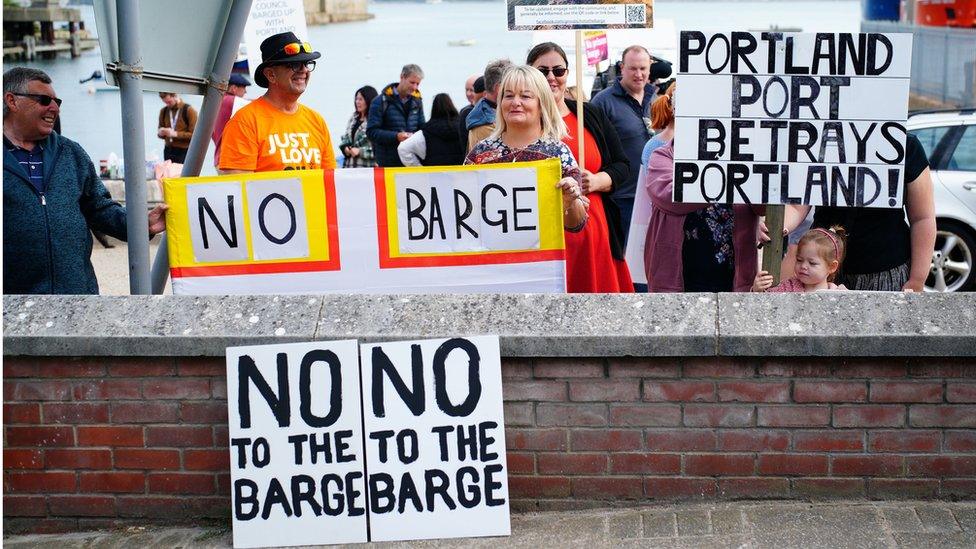
There has been considerable local opposition to the barge coming to Portland
The local authority has not mounted a legal challenge to the barge, stating that it would be costly and have little chance of success.
The vessel is part of the government's policy to reduce the costs of placing migrants in hotels.
The Home Office said: "Delivering accommodation sites such as the Bibby Stockholm will be more affordable for taxpayers, helping to reduce the £8m daily cost of hotels as well as being more manageable for local communities.
"We're confident that the project, which will house asylum seekers in safe and secure accommodation, meets the planning requirements."
The 222-room, three-storey barge, chartered by the government for 18 months, arrived at the port in July.
It was previously used to accommodate homeless people and asylum seekers in Germany and the Netherlands.

Asylum Barge: Controversy In A Community
How a floating home for asylum seekers has caused divisions in a local community of Portland in Dorset
Watch now on iPlayer (UK only)


You can share your views about the Bibby Stockholm by emailing haveyoursay@bbc.co.uk, external.
Please include a contact number if you are willing to speak to a BBC journalist. You can also get in touch in the following ways:
WhatsApp: +44 7756 165803
Tweet: @BBC_HaveYourSay, external
Please read our terms & conditions and privacy policy
If you are reading this page and can't see the form you will need to visit the mobile version of the BBC website to submit your question or comment or you can email us at HaveYourSay@bbc.co.uk, external. Please include your name, age and location with any submission.

Follow BBC South on Facebook, external, X, external, or Instagram, external. Send your story ideas to south.newsonline@bbc.co.uk.
Related topics
- Published11 October 2023
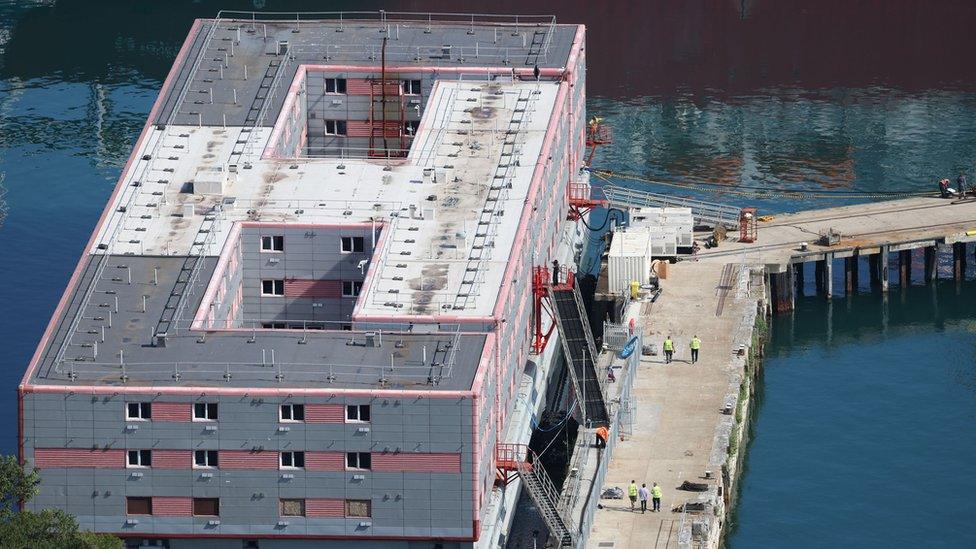
- Published20 September 2023

- Published5 September 2023
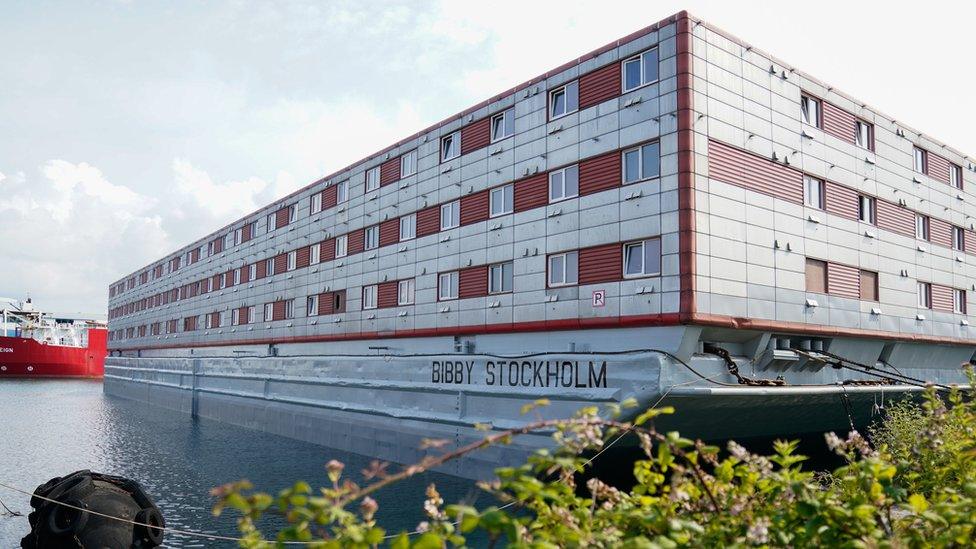
- Published28 August 2023
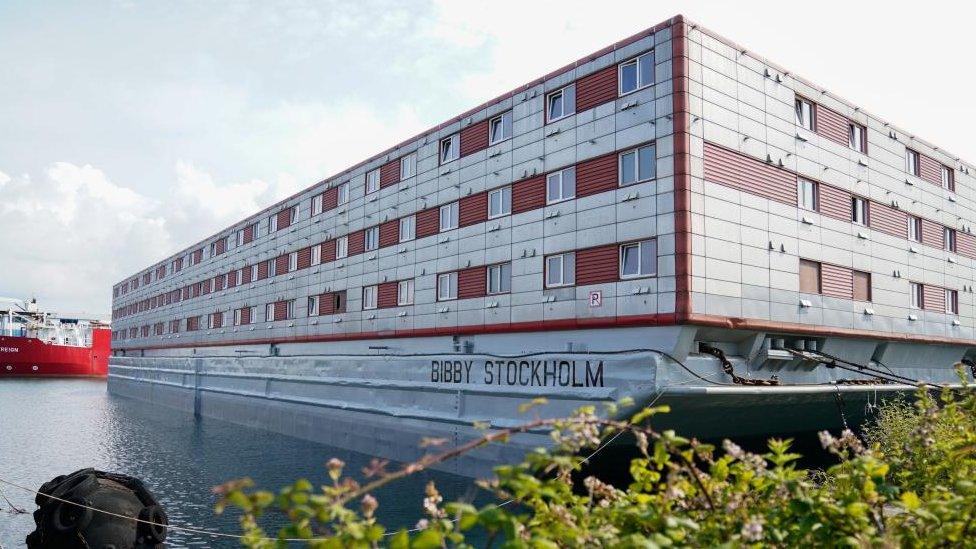
- Published25 August 2023

- Published18 August 2023

- Published12 August 2023
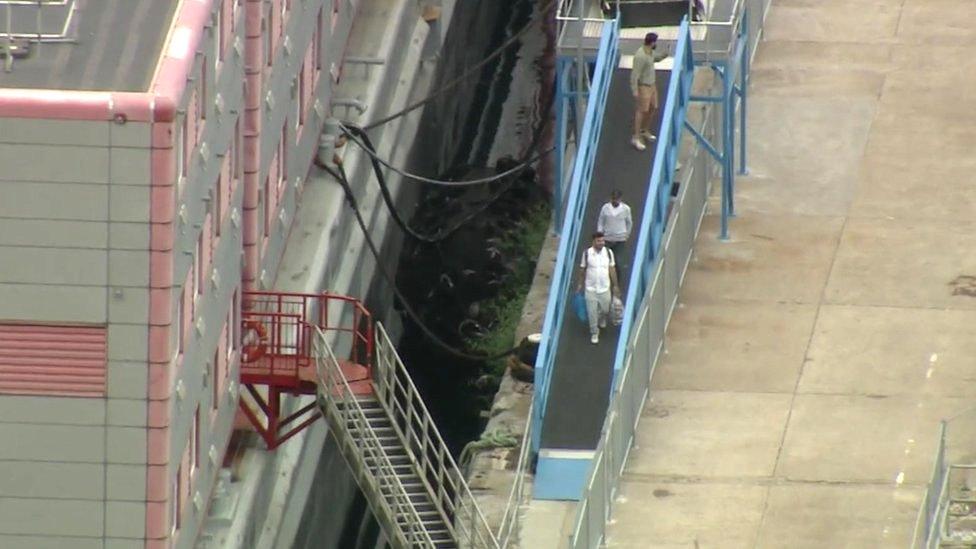
- Published9 August 2023
